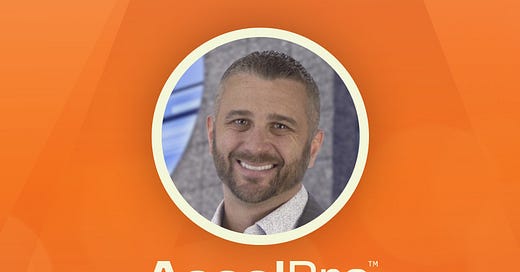Listen on Apple Podcasts, Spotify and YouTube.
You’re invited to join free coaching sessions on navigating your career. How do you build productive relationships with clients? Are you considering moving from a firm to an in-house counsel role? Invitations to upcoming events are coming soon.
Welcome to AccelPro IP Law, where we provide expert interviews and coaching to accelerate your professional development. Today we’re featuring a conversation with Chad Gottlieb, Partner and Chief Growth Officer at DarrowEverett.
Protecting brands and trademarks on the internet and social media requires monitoring and planning for when things go wrong. The digital revolution has led to a set of unintentional consequences for trademark and licensing protection.
In this interview, Gottlieb discusses naked licensing, third party improper use, protecting trademarks on the internet and more.
Listen on Apple Podcasts, Spotify and YouTube.
Interview References:
Chad Gottlieb’s DarrowEverett profile.
2:36 | Naked Licenses of Trademarks to Unmonitored Licensees (2022). Justia.
3:48 | Whart Are the Benefits of Trademark Management Software? (2023). IPzen.
12:30 | Federal Trade Commission Act.
Supplemental Materials:
Born in the USA? Product Origin Claims Nothing to Mess With.
What’s Worse: The Pain or the Hangover? Brand Endorsements in the Fallout of Yeezy.
TRANSCRIPT
I. NAKED LICENSING & SOCIAL MEDIA MONITORING
Neal Ungerleider, Host: Can you give our listeners some background on DarrowEverett?
Chad Gottlieb: DarrowEverett is located in Florida, New York, Austin, South Carolina, North Carolina, and Tennessee. We have eight offices and we are a full service law firm that does everything under the sun. We have a strong focus on mergers and acquisitions.
NU: Can you tell us about your role there and the kind of work that you personally focus on?
CG: I'm a partner and also the Chief Growth Officer, so that gives me the best of both worlds.
I get to practice law, but I also get to practice the business side of our law firm. Most people don't think about the fact that a law firm is also a business. But if you can run it that way, you can run it successfully.
I have the opportunity to participate in both facets. My main role as a lawyer is mergers and acquisitions, but I get to do a lot of work on the intellectual property side. This includes marketing and telemarketing and intellectual property. Those are my main roles at the firm, and I've been with the firm for over seven years.
NU: You've written about the need for trademark owners to exercise quality control over marks, or the quality of trademark goods or services used by a third party to non-abandoned trademark rights. Can you tell us what companies should think about when they structure and implement quality control measures through their agreements with these third parties?
CG: The article you're discussing, I believe, is about naked licensing, which is a principle in trademark law that kind of says if you don't use it, you lose it, or if you don't properly protect it, you lose it. When it comes to any type of intellectual property, but focusing on trademarks, you really need to set mechanisms in place for monitoring and maintaining. You do that through different mechanisms.
On the monitoring side, you will want to set up a service with a third party provider. There are quite a few of them available online, and they charge a monthly fee. Depending on the scope of the service, they'll either search the internet generally or search UFPTO filings and flag those for you and send them over to you if you need to take action—so that’s on the monitoring side.
On the maintenance side, it’s about maintaining a trademark portfolio tool. Again, there is lots of software out there that offer different options that provide friendly reminders for maintenance requirements, whether it's under trademark law and it's a Section Eight or Section Fifteen filing. The platform will make sure that you don't forget those.
Additionally, having some form of contractual oversight is important–particularly when third parties are utilizing your brands and your trademarks. So, if you're in a business that provides for a distributor relationship and those distributors or licensees are using your trademark, you're going to want to make sure that you have proper processes and procedures in place in order to make sure that you don't jeopardize those rights because that third party essentially takes advantage of them.
NU: From your perspective, how much do companies need to canvas social media and ecommerce sites to show they have not abandoned their mark?
CG: That's a good question. In the context of third party improper use, it's definitely important. The premise of the article that you're referring to on naked licensing really relates to those where you know they're using it. In the instance that you're talking about, I would say that's more brand protection and brand awareness of what's being put out there.
As we know, the IP that sits on a lot of these huge companies, from Amazon to Google to Apple, is huge. The value they've invested and the value in their name.
Without providing the adequate protections, they do not necessarily have legal implications, but more so business implications. So counterfeit goods, etc.
It's definitely important because with additional modes of communication–particularly social media–it makes it even more imperative for companies to make sure that they're staying ahead of the curve when it comes to confirming that they know what's going on with their brand.
—
II. POLICING MARK QUALITY
NU: What role might e-commerce sites themselves play in how companies police the quality of their marks? For example, Etsy has its own rules for trademark infringement claims specifically. Are there ways a company might rely on these sites and platforms to protect the quality of their marks more broadly? Would companies work directly with these sites or platforms to have these issues flagged?
CG: It depends on the platform. From our experience, some are better than others. eBay, for example, has its own policies. Even Amazon has a registration process in which you can put your registered trademarks within their kind of database.
The problem is you're dealing with red tape and you're dealing with bottlenecks in connection with any type of business process. But does it make sense, especially for larger brands, to work within the kind of rules of these platforms? Yes, for sure.
But in my experience, from a number of sellers that we represent on different e-commerce platforms, including Amazon or Etsy—they still run into issues, and they still try to go through the takedown process or the dispute process for the platform, and despite having valid intellectual property rights they are not always successful. And that's when they have to take additional measures.
With that said, it is prudent, particularly for the average business owner, to do that on their own because coming to me and spending X dollars an hour isn't always going to make sense for a smaller sized business.
NU: Apart from exercising quality control over marks, through contractual provisions, and through adequately supervising quality of marks, how can companies better protect their IP on social media or e-commerce sites?
CG: There are platforms out there that provide it, but larger companies that can afford it within their marketing department have dedicated people that are looking through and seeing what's being posted, whether it's tagged or involves their name or technology—because there are platforms that, similar to the monitoring platforms, are also going to search social media posts, etc., and flag those things—those are going to be the most valuable tools for companies that can afford them.
NU: For legal teams working with larger brands and companies, do you have any recommendations for working with their clients on trademark or copyright strategy, especially in regard to social media?
CG: 100%. Every company that is relying on or pushing out content, particularly content that includes triggering claims or claims in which they're trying to persuade an individual consumer to purchase a good or a service, really should have a process internally that includes marketing guidelines that are clear. They should explain how internal partners or providers that are doing marketing, as well as external partners, are required to present the brand, but also what claims they can and can’t make, and how these claims should be made in connection with the goods or services.
The other very good item, particularly for those in more regulated industries, that we always recommend to clients is to document things. When a regulator comes in and wants to inquire about what your ads were in 2017, you don’t want to be scrambling around searching for emails or calling providers.
NU: You've written about the importance of having solid brand licensing agreements when working with an endorser or an ambassador, and you indicated that working with someone who's more akin to a brand partner and additional IP that generates, including trademarks, service marks, design patterns, requires forethought in who owns the right to that content and how to protect it. Can you tell us a little bit about the considerations there?
CG: When it comes down to the different IP, whether it's copyright, a patent, or a trademark—generally the creator or the inventor is the one that is invested in the rights, absent different exemptions. So, from a high level principle, when you're dealing with those third party content creators that aren't employees, and they're doing this outside the course and scope of what they normally do for you, you want to make sure that you have written agreements with them that are very clear as to the ownership of the resulting IP, and that they will take any steps necessary to assign it, including signing conveyance documents, etc.
I've definitely had many instances where clients have had issues, whether it's audio or video content—that they've had to fight over ownership because they didn't have proper written agreements in place.
NU: You've also written previously about bad acts of brand influencers triggering morality clauses and licensing agreements. What are the issues with the ability to enforce these morality clauses? Generally speaking, how well do they hold up in courts and what should companies and their representation consider when deciding to invoke the clause? Should companies anticipate major disputes or litigation there? And why might a reasonableness requirement be useful?
CG: Definitely popular, definitely enforceable, but if there's a breach with respect to a morality clause, it's generally very factually intensive. And it'll be tied to what the morality triggers are, which can vary from industry, and contract to contract.
But the general standard ones you see with those things that have a material or an adverse impact on the brand that's being represented, or any criminal acts. The more common ones are definitely enforceable. I mean, there's freedom of contract as long as the parties negotiated those terms.
I definitely would recommend that brands that are entering into agreements, particularly those larger agreements, have those provisions in place because they are important and there may be instances where you need to enforce them because, with the prevalence of information sharing globally, things spread very fast.
There have been quite a few instances in which those clauses have had to be enforced. From Kanye West, etc., you know they're going to fight back, right? Because there's a lot of money on the line. And that's what it comes down to, really—a factual question as to whether or not the conduct or the actions or inactions of the brand ambassador violated the clause.
NU: On the flip side, for social media influencers who are looking to partner with brands, what are some of the major gray areas they should keep in mind in terms of endorsement implications and disclosure requirements?
CG: The biggest thing for influencers, or any third party that's going to endorse a brand is really just complying with the FTC’s endorsement guidelines. They are issued under the FTC Act which essentially protects consumers against unfair and deceptive trade practices. So those guidelines are kind of like the roadmap of what the FTC would consider a violation of the FTC Act, and it is very important.
The core of it is to clearly and conspicuously disclose material affiliation and any consideration one received in connection with endorsing—because that's where we see, whether it's the FTC or the SEC or Kim Kardashian—those are the things that regulators come down on, where people use their influence within the marketplace to tout products but don't clearly disclose that they're going to financially benefit from some of those products.
—
III. ON IP LAW
NU: What was your pathway to IP like?
CG: My last year of law school I was in South Florida. I always wanted to move to New York. It was just a dream of mine. I don't know why… maybe it was to get out of the warm weather.
I got an opportunity to do an externship my last semester of law school at a boutique entertainment law firm, and it was awesome. They worked with different artists from Rhianna to Run-DMC, and I had to review those contracts. I thought it was the coolest thing to really understand how the music industry worked.
When I was finishing up the externship I was about to graduate law school, and at that point I decided that I wanted to go and get my LLM, which is a Master of Law. That's another year. I don't know why I wanted to go to school for another year. I was probably crazy, but I got my LLM intellectual property degree at Cardozo and it allowed me to stay in New York for another two years.
That's really where my interest began. Historically, when it comes to typical IP work, I've always focused on trademark prosecution and clearance and licensing. I also really love doing the marketing side of it and the branding, and the brand awareness and compliant persuasion marketing that helps our clients' bottom line, but does so in a fair way for the consumers.
NU: When you started your legal career, what were some of the most unexpected things you learned work-wise over the first couple years?
CG: Wow, that's a good question. There's a big learning curve, right? What you learn in law school and what you're going to learn as a lawyer—it helps maybe create a foundation for the way you think, but really, you don't learn how to be a lawyer until you practice law. And it's not something that happens overnight. It's something that takes a lot of dedication and effort, and there are going to be points in anyone’s career in which a person is going to be stressed out or overwhelmed. But eventually you get to a point where you're comfortable in your career, and you're comfortable with the decisions you're making. It takes a while—and when you get there it’s a good feeling.
NU: I also wanted to ask about taking on a leadership role at a firm: do you have any recommendations for listeners who might be starting in a leadership role and taking that on in addition to their previous job duties?
CG: I can give you two tips. One is a more generalized tip, which is something I like to remind myself and the people we work with. We spend more than half our life working, so you can either go into it enjoying every day and making those around you enjoy it every day, or you can do the opposite.
Definitely the former, to me, is the way to go. And if you can add that mindset, it'll slowly trickle down to those around you and those you work with. It just makes a much better work environment, no matter what industry you're in.
The other item is more micro with respect to managing a firm. Often, it's hard asking clients for a retainer or asking clients to pay a bill, but we're service providers and we're providing a service and we're honoring our commitment to our clients—so then it’s only fair to ask them to do the same.
Listen on Apple Podcasts, Spotify and YouTube.
This AccelPro audio transcript has been edited and organized for clarity. This interview was recorded on May 25, 2023.
AccelPro’s interviews and products accelerate your professional development. Our mission is to improve your day-to-day job performance and make your career goals achievable.
Please send your comments and career questions to questions@joinaccelpro.com. You can also call us at 614-642-2235.
If your colleagues in any sector of the IP law field might be interested, please let them know about AccelPro. As our community grows, it grows more useful for its members.












